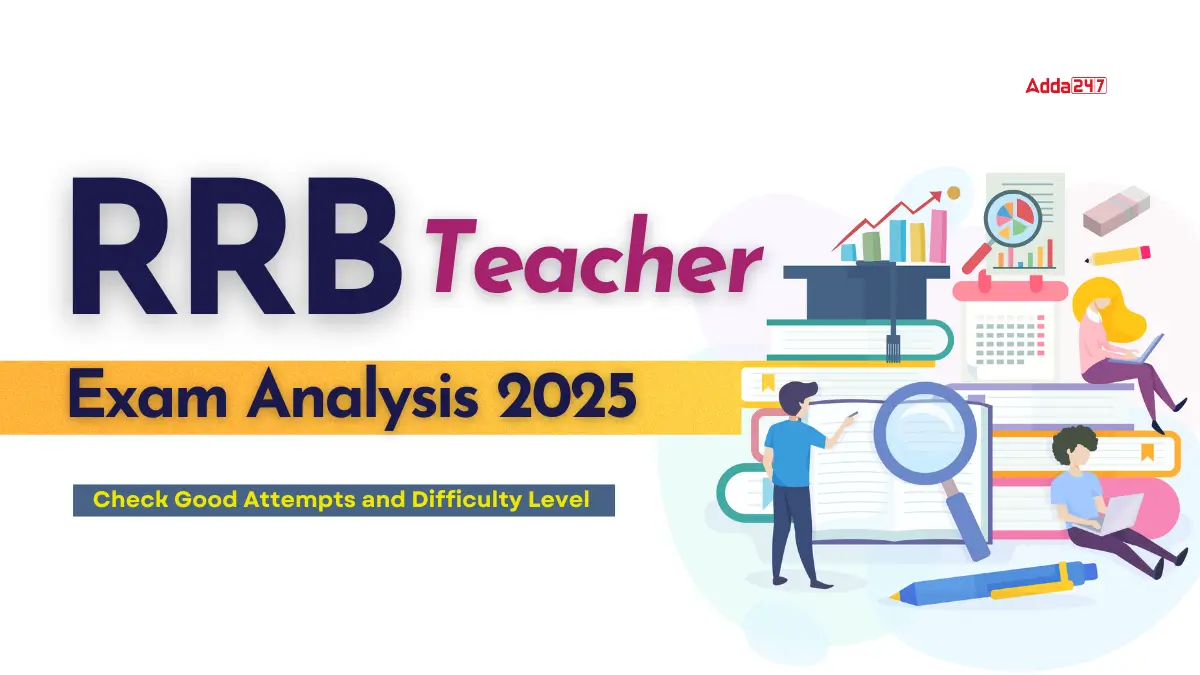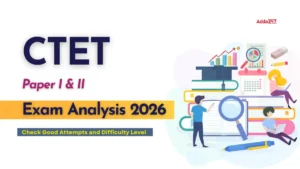Table of Contents
The RRB Teacher Exam 2025 has created significant anticipation among aspirants aspiring for teaching posts under the Railway Recruitment Board. To help candidates navigate this highly competitive exam, we present the most authentic and comprehensive RRB Teacher Exam Analysis 2025 for 10 September 2025 (Shift 1 Exam and Shift 2 Exam). With lakhs of candidates appearing across multiple shifts, understanding the exam trend, difficulty level, and safe attempts is crucial. This analysis enables aspirants to assess their performance, anticipate cutoffs, and fine-tune their preparation for future sessions, making it an indispensable resource for serious contenders. Check out the RRB Teacher Exam Analysis for TGT PGT Exam conducted in the shift 1 on 10 September 2025.
RRB Teacher Exam Analysis 2025: Key Highlight
- Overall, both shifts were rated easy to moderate, with Shift 1 slightly easier than Shift 2.
- Many students compared the paper level to CTET, making it approachable for well-prepared candidates.
- Professional Ability (CDP): Shift 1 students found it slightly tough, while Shift 2 had lengthy but manageable questions. Conceptual clarity was key.
- General Awareness: Both shifts had factual questions. Focus areas included history, polity, geography, and current affairs (till August 2025).
- Reasoning: Considered the most scoring in both shifts, with questions on syllogism, seating arrangement, coding-decoding, and series.
- Mathematics: Moderate in both shifts. Questions were from simplification, CI & SI, square roots, area, and proportion. Required speed and accuracy.
- General Science: Concept-based questions dominated. Topics included hydrocarbons, litmus test, sound waves, and chemical equations.
- Students with strong NCERT foundation and practice found the paper easier than those relying on rote learning.
- Good Attempts: Shift 1 ranged between 83–93, while Shift 2 was lower at 75–85.
- Consensus: A mix of conceptual clarity, time management, and balanced preparation across subjects determined success.
RRB Teacher Exam Analysis 2025: Student Review for 2nd Shift 10 Sep
- Many students felt the exam was at CTET level, making it approachable for well-prepared candidates.
- Questions from Professional Ability were slightly lengthy but manageable with conceptual clarity.
- General Awareness had direct and factual questions, mostly from history, polity, geography, and current affairs (up to August 2025).
- Reasoning was scoring, with standard topics like syllogism, seating arrangement, coding-decoding, and series.
- Mathematics was moderate, with questions from simplification, CI & SI, area, square roots, and proportion.
- General Science questions were conceptual, covering hydrocarbons, litmus test, sound waves, and chemical equations.
- Students with strong NCERT knowledge and regular practice reported 70-75 safe attempts.
RRB Teacher Exam Analysis 2025 : Student Review for 1st Shift 10 Sep
- The paper was easy to moderate overall.
- Reasoning was the easiest, while GK and Professional Ability were slightly tough.
- Maths and Science were balanced, requiring conceptual clarity.
- CDP (Professional Ability) level felt a bit hard to many.
- Students reported a good attempt of 83-93 questions.
- Consensus: If concepts were clear, the paper felt easy; rote learning alone wasn’t enough.
RRB Teacher Exam 2025 Subject-Wise for 2nd Shift 10 Sep (TGT and PGT)
RRB Teacher Exam 2025 Good Attempts & Difficulty Level
Good attempts give a clear picture of a candidate’s performance and qualifying chances. Based on expert review and student responses, the RRB Teacher Exam 2025 (2nd Shift) was overall easy to moderate, though some sections were slightly more challenging. On average, well-prepared aspirants with good conceptual clarity and effective time management could attempt 75-85 questions safely, making the paper fair and manageable.
| RRB Teacher Exam Good Attempts and Difficulty Level | |||
| Section | Total Questions | Good Attempts | Difficulty Level |
| Professional Ability | 50 | 38-44 | Moderate to Hard |
| General Awareness | 15 | 11-13 | Easy to Moderate |
| General Intelligence & Reasoning | 15 | 12-14 | Easy |
| Mathematics | 10 | 7-8 | Moderate |
| General Science | 10 | 7-8 | Moderate |
| Total | 100 | 75-85 | Easy to Moderate Overall |
RRB Teacher Exam Analysis for General Awareness
- States sharing international boundaries
- Tropic of Cancer passes through which states
- Civil Disobedience Movement
- India’s oldest mountain range
- Human Rights
- Fundamental Rights (2 questions)
- Current Affairs (up to August 2025)
- Subhash Chandra Bose Birth Anniversary
- Raja Ram Mohan Roy and Sati Pratha
RRB Teacher Exam Analysis for General Intelligence & Reasoning
- Syllogism
- Number Series
- Coding and Decoding
- Seating Arrangement
- Boxes stacked one upon another
RRB Teacher Exam Analysis for Maths
- Area of regular hexagon
- Square root
- Square of 67
- Simplification
- CI and SI
- Pipe and Cistern (1 question)
- Third proportion (3, 7, 9)
RRB Teacher Exam Analysis for General Science
- Saturated and unsaturated hydrocarbons
- Elements and Compounds (Assertion & Reason type)
- Chemical Equation
- Litmus Paper test
- Infrasonic sound (below 20 Hz)
RRB Teacher Exam Analysis for Professional Ability (TGT & PGT)
- Philosophy – Concept and Meaning
- Psychology – Definition and Propounders
- Theories of Intelligence (Factor theory, g & f factor, Multiple Intelligence, Guilford’s 180, SOI)
- Developmental Stages (Piaget)
- Motivation Theory (Maslow Hierarchy, Healthy Mind-Healthy Body concept, Aristotle’s view)
- ID, Ego, Superego (Psychoanalytic theory)
- Gestalt Theory
- Curriculum and Instructional Methods (Subject-Centric, System Approach, Instructional Method, Evaluation, Autocratic & Democratic methods)
- Moral Values and Disability-related questions
RRB Teacher Exam 2025 Subject-Wise for 1st Shift 10 Sep (TGT and PGT)
RRB Teacher Exam 2025 Good Attempts & Difficulty Level
Good attempts are a key indicator of a candidate’s performance and chances of qualifying. Based on expert analysis and student feedback, the RRB Teacher Exam 2025 was overall easy to moderate, with variation across sections. Overall, aspirants with strong conceptual knowledge and time management could safely attempt 83-93 questions, making the exam manageable for well-prepared candidates.
| RRB Teacher Exam Good Attempts and Difficulty Level | |||
| Section | Total Questions | Good Attempts | Difficulty Level |
| Professional Ability | 50 | 40-45 | Moderate to Hard |
| General Awareness | 15 | 12-14 | Easy to Moderate |
| General Intelligence & Reasoning | 15 | 13-15 | Easy |
| Mathematics | 10 | 7-9 | Moderate |
| General Science | 10 | 7-9 | Moderate |
| Total | 100 | 83-93 | Easy to Moderate Overall |
RRB Teacher Exam Analysis for General Awareness
The General Awareness section was of easy to moderate difficulty, testing candidates on a wide range of topics. Questions covered polity, history, geography, economy, and general science, with additional emphasis on current affairs and education-related developments. Candidates who had revised NCERT basics, government schemes, and major historical and geographical facts found this section straightforward and scoring.
- 73rd and 74th Constitutional Amendments (Municipality Commission Act)
- Indian History: Revolt of 1857 (region-based), Doctrine of Lapse, SC/ST-related questions
- Economy & Polity: LPG Reforms, Election Commission, Sainya Andolan
- Geography: Oldest mountain range, river in Thar Desert, Vardhaman
- Current Affairs: Javelin Throw (Annu Rani), Sania Mirza’s first Grand Slam win, UN convention on education
- Questions from education-specific current affairs were also asked.
RRB Teacher Exam Analysis for General Intelligence & Reasoning
The Reasoning Ability section was easy to moderate, with a mix of straightforward questions and some time-consuming puzzles. Those with a strong grip on analytical reasoning and problem-solving techniques were able to complete this section comfortably within the allotted time.
- Circular table sitting arrangement
- Box arrangement
- Linear seating arrangement
- Coding-decoding
- Alphabet and number series
- Syllogism
RRB Teacher Exam Analysis for Maths
The Mathematics section was of moderate difficulty, focusing on both conceptual understanding and problem-solving skills. Candidates who had practiced regular numerical problems and formula applications found this section manageable and scoring. Accuracy and quick calculations were key to attempting all questions within the given time.
- BODMAS (3 questions)
- CI & SI (including difference-based questions, 5% interest problems)
- MRP and loss percentage
- Perimeter of triangle
- Speed, distance, and time
- Simple interest with discount-based rate calculation (12% result-based question)
RRB Teacher Exam Analysis for General Science
The General Science section was of moderate difficulty, with questions that tested conceptual understanding and practical application. Aspirants with a clear understanding of basic science concepts from Physics, Chemistry, and Biology found this section scoring, while questions requiring applied reasoning or conceptual clarity posed a moderate challenge. Accuracy and familiarity with standard formulas and processes were key to performing well in this section.
- Nitrogen fixation and ammonium nitrate conversion
- Rheostat symbol
- Chemical equations and reactions
- Neutral substances and litmus paper effect
- Cell membrane structure and function
- Biology: nerve, muscular tissue, epidermis question
- Chemistry: compound identification
- Some questions required clarity on conceptual application.
RRB Teacher Exam Analysis for Professional Ability (TGT & PGT)
The Professional Ability section was one of the most important and challenging parts of the RRB Teacher Exam, testing candidates on pedagogy, educational psychology, and teaching methodologies. The difficulty level ranged from moderate to hard, with questions requiring a solid grasp of theories, teaching methods, cognitive development (Piaget), motivation, Gestalt principles, and educational philosophy. This section distinguished well-prepared candidates, as success depended not only on knowledge but also on accuracy, analytical thinking, and effective time management under pressure.
- Piaget’s stages of cognitive development (including 1st stage)
- Logical reasoning in teaching
- Teacher control methods
- Cultural lag
- Literature-based method
- Group method in teaching
- Learner-centered methods
- Relation between education and psychology
- Relation between education and culture
- Experience learning theory (by whom)
- Animism
- Tabula Rasa (Blank Slate theory)
- Rousseau’s book
- History of Psychology
- Id, Ego, Superego (Freud)
- Gestalt psychology
- Origin of the word “Psychology” (language-based)




 CTET Exam Analysis 2026 for 8 Feb, Check...
CTET Exam Analysis 2026 for 8 Feb, Check...













